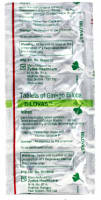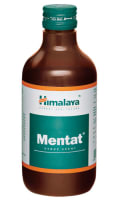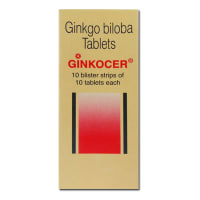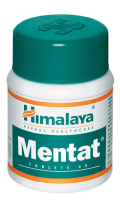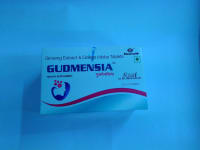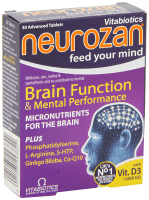COMPOSITION:
Memantine (10mg)
Therapeutic Uses:
neuro cns

Interaction with alcohol is unknown. Please consult your doctor.

PROBABLY SAFE
Mentra 10mg Tablet is probably safe to use during pregnancy.Animal studies have shown low or no adverse effect on the foetus, however, there are limited human studies. Please consult your doctor.

No information is available on the use of Mentra 10mg Tablet during lactation. Please consult your doctor.

Mentra 10mg Tablet may cause side effects which could affect your ability to drive.

Mentra 10mg Tablet should be used with caution in patients with severe kidney disease. Dose adjustment of Mentra 10mg Tablet may be needed. Please consult your doctor.

Mentra 10mg Tablet should be used with caution in patients with severe liver disease. Dose adjustment of Mentra 10mg Tablet may be needed. Please consult your doctor.Limited information is available on the use of Mentra 10mg Tablet in these patients. No dose adjustment is recommended in patients with mild to moderate liver disease.
Uses of Mentra Tablet
Mentra 10mg Tablet is used in the treatment of
How to use Mentra Tablet
Take this medicine in the dose and duration as advised by your doctor. Swallow it as a whole. Do not chew, crush or break it. Mentra 10mg Tablet may be taken with or without food, but it is better to take it at a fixed time.
How Mentra Tablet works
Memory loss in Alzheimer’s disease is due to an imbalance of chemical messengers in the brain. Mentra 10mg Tablet works by blocking the action of glutamate, a chemical messenger involved in the transmission of nerve signals.
Common Dizziness, Headache, Confusion, Constipation.
Expert advice for Mentra Tablet
Mentra slows down the progression of the disease; it doesn't stop or reverse it. Inform your doctor if you have ever been diagnosed with any heart problems (high blood pressure, heart attack, heart failure, slow or irregular heart rate). Inform your doctor if you have ever been diagnosed with any epileptic seizures. Mentra may raise the chances of seizure if you had in the past. Inform your doctor if you are pregnant or planning to conceive or breastfeeding. Inform your doctor if you have ever been diagnosed with kidney or liver problems.
Q. Is Mentra a psychotropic drug?
A psychotropic drug is a medicine affecting the mind, emotions, and behaviour. Mentra has a beneficial effect on the behavioural symptoms of patients with moderate to severe Alzheimer's Disease. Therefore it is considered as a psychotropic agent.
Q. Is Mentra a narcotic?
No. Mentra is not a narcotic. It does not have habit forming potential.
Q. Is Mentra a mood stabiliser?
No. Mood stabilisers are used to treat mania and bipolar disorder. Mentra is not approved for these conditions yet, although studies are going on for the role of Mentra in these diseases also.
Q. Is Mentra a nootropic.
No. Mentra does not fit in the generally accepted "Nootropic" descriptor for healthy people. Nootropics are drugs which increase cognition/ motivation/ creativity in healthy individuals. Mentra, on the other hand, improves cognition in patients with Alzheimer's Disease.
Q. Is Mentra a cholinesterase inhibitor?
No. Mentra does not function by inhibiting the cholinesterase enzyme found in the endings of nerve cells. Rather, it acts by preventing the toxicity of an excitatory substance called glutamate in the brain.
Q. Is Mentra a NMDA receptor antagonist?
Yes. Mentra acts as an antagonist at the NMDA receptor. This is the receptor in the brain through which glutamate, an excitatory substance, damages the nerve cells in the brain, which is found in Alzheimer's disease.
Q. What is Cmax of Mentra?
Cmax (Peak plasm concentration) of Mentra is 35-40 ng/ml.
Q. Can I take Mentra with vitamin D?
It has been reported in some studies that a combination of Mentra and Vitamin D improves cognition in Alzheimer's Disease. However, more studies are required to confirm this finding.
Q. Can I take Mentra with vitamin E?
Some studies have reported that among patients with mild to moderate Alzheimer's disease, taking alpha-tocopherol (Vitamin E) with Mentra slows the progressive functional decline. However, more studies are required to confirm this finding.
Q. When to start Mentra?
Mentra is started when a person starts suffering from moderate to severe Alzheimer's Disease and has failed other options. Despite years of research for mild Alzheimer's Disease, Mentra has not been found to be useful in it.
Q. Why is Mentra prescribed?
Mentra is prescribed to improve the cognitive (memory) function in patients with Alzheimer's Disease when other treatment options like cholinesterase enzyme inhibitors have failed.
Q. What is the interaction of Mentra with metformin?
The interaction between Mentra and Metformin is minor. Mentra oral increases the level or effect of metformin by nonacidic drugs competing for the same pathway through the kidney.
Q. What is the interaction of Mentra with warfarin?
No known interaction between Mentra and Warfarin has been found.
Q. Can Mentra used in dementia with Lewy bodies?
The role of Mentra in Lewy Body Dementia (LBD) is controversial. Some studies suggest that it is safe and efficacious in this disease whereas others have shown exacerbation of LBD due to Mentra. Mentra is not approved for use in Lewy Body Dementia.
Q. Can Mentra combined with donepezil?
A combination of Mentra and Donepezil can be given in moderate to severe Alzheimer's Disease. It has been shown that the combination may have additive effects i.e. effects of both drugs are added when given together in some studies.
Q. Can Mentra be used with rivastigmine?
Mentra in combination with rivastigmine is safe and beneficial in patients with Alzheimer's Disease. Patients have improvement or stabilisation on dual therapy.
Q. Can Mentra be used for chronic pain?
Mentra is not indicated for use in chronic pain. It has been proposed as a medication for the treatment of neuropathic pain for its mechanism, safety, lack of serious adverse effects, and the relatively rapid onset of action. However, studies have not been promising so far and its routine use in neuropathic pain is not currently recommended.
Q. Can Mentra be used for opiate withdrawal?
Mentra is not indicated for use in Opioid withdrawal. In a number of small studies, it has been seen that Mentra decreased the expression of opioid physical dependence in humans but there is a need for more studies in this field.
Q. Can Mentra be used for autism?
Mentra has failed to demonstrate clinical efficacy in autism. Studies are currently in progress for other clinical applications.
Q. Can Mentra use for dementia?
Mentra has failed to demonstrate clinical efficacy in vascular dementia although it was well-tolerated.


 Mentra 10mg Tablet
Mentra 10mg Tablet  Bookmark
Bookmark

